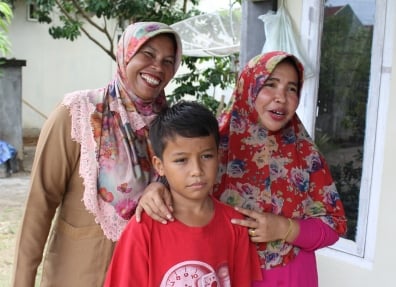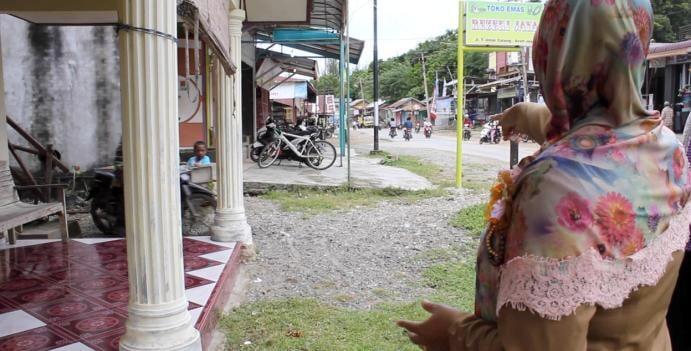ACEH JAYA, Indonesia – The morning of 26 December, 2004, started out like any other Sunday for Nur Asiah. The mother of two was up early washing clothes outside her parents-in-law’s house in a coastal village in the district of Aceh Jaya. But her weekend routine was abruptly interrupted when a 9.1magnitude earthquake struck off the coast of Sumatra.
As the ground started to shake, Ms. Asiah rushed back inside the house to find her eight-month-old son.
“I just wanted to hold my baby,” Ms. Asiah recalls. “I remember a man running through the village screaming that the water was receding and that there were fish on the beach.”
Before that day, she had never heard the word ‘tsunami’.
On orders of Indonesia’s Armed Forces, with her son on her back and her five-year-old daughter and in-laws by her side, Ms. Asiah scrambled through the forest and made it to the top of a mountain just in time to see giant waves sweep away her village.
“I saw people get pulled into the water,” she recalls. “It was so crowded and people were confused because they didn’t know what a tsunami was. I didn’t even know whether my husband was okay.”
Heeding the call of duty
As members of her village comforted each other and came to terms with what had just happened, another community member contacted Ms. Asiah to ask for her assistance with a heavily pregnant woman at a different location. At the time, she says she felt like she wasn’t ready to help, still too distressed by what she had just seen.
“I hadn’t even been in touch with my husband yet, but my mother-in-law told me to be strong,” explained Ms. Asiah, who has been a midwife since 1994. “So I walked to where the expectant mother was, to help her.”
With no medical facilities, let alone any enclosed areas to examine the pregnant woman, she had to deliver the baby on the grass, in the open, amid chaos.
“I still remember it was about 10pm when I delivered the baby,” says Ms. Asiah, a member of the UNFPA-supported Indonesian Midwives Association (IBI). “I had no medication, tools or equipment to assist the birth, but thanks to God the baby and mother survived.”
Providing reproductive health services amid chaos
The 2004 Indian Ocean tsunami killed an estimated 230,000 people and devastated coastal communities in 11 countries. The Indonesian province of Aceh was among the worsthit areas, with around 130,000 people killed and more than half a million displaced.
Soon after the natural disaster, UNFPA Indonesia provided support to address the reproductive health problems of Aceh’s tsunami-affected population. The Fund helped reestablish reproductive health services and distributed information on maternal health, family planning and prevention of genderbased violence in the four most-affected districts – Banda Aceh, Aceh Barat, Aceh Jaya and Aceh Besar.
Each of the 10 puskesmas (public health centres) across the four districts were equipped with an ambulance with the capacity to provide basic resuscitation equipment and emergency obstetric care.
A special population census to determine the population impact of the tsunami was also organized in Aceh and Nias – a small neighbouring island also affected by the disaster.
Pioneering the dignity kit
Significantly, UNFPA’s support also included the distribution of clean delivery and hygiene kits. The latter have become known as ‘dignity kits’ and are a trademark component of UNFPA’s humanitarian response around the world.
Pioneered in the wake of the Indian Ocean tsunami, dignity kits comprise the basic items that women and girls need to protect themselves and maintain hygiene and respect in the face of natural disasters.
Preserving dignity is essential to selfe-steem and confidence – and critical to protection.
Often overlooked during emergency responses, basic items like sanitary napkins, a flashlight and a change of clothes enable women to interact comfortably in public and maintain personal hygiene, especially menstrual hygiene, which is crucial in allowing them to access other essential relief items like food and shelter. In addition, dignity kits provide a gateway that allows UNFPA to discuss wider sexual and reproductive health and protection concerns with affected communities, particularly women and girls.

Continuing to save lives
Ms. Asiah eventually reunited with her husband 10 days after the tsunami hit her hometown. But it wasn’t until three months later that she and her family were able to leave the makeshift emergency camp in the mountain to return to the place where their home once stood and begin rebuilding their lives.
In the meantime, she continued to help with relief efforts.
“As it was a humanitarian disaster, my role and priority as a midwife was not only to care for pregnant women and provide advice and psychological support to women and children, but I was also there to help tsunami victims with any type of medical attention needed.”
Today, Ms. Asiah still resides in the very same coastal village in Aceh Jaya and continues to work as a midwife. Eva – the mother who gave birth with Ms. Asiah’s help atop the mountain that fateful day – lives just a fiveminute drive away.
The two women, who didn’t know each other before the disaster, are now friends and their children attend the same school – bonds born of a tragedy that nonetheless inspired best practices in humanitarian response, providing lifesaving services to secure the wellbeing of generations to come.


